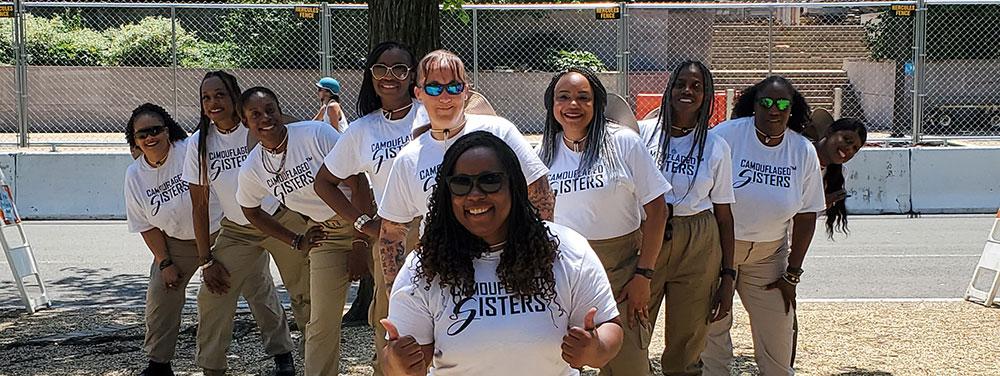Finding Your New Platoon

By Abeni Celeste Scott
‘Why am I crying like this?’ I asked myself because I couldn’t believe something as simple as doing the laundry triggered such an emotional response.
I was less than a year out of the military after honorably serving for 20 years. I had a great career and was ready for retirement. What I was not ready for was the emotional rollercoaster that came with transition. There I stood in my laundry room crying uncontrollably having just realized that I would never be washing or wearing my Army uniform again. Wow! So started my journey to find my new platoon – a group of women who could relate to my struggles.
I needed a safe place to talk about these feelings because they were new to me. I was a leader in uniform, I ran a multi-million-dollar warehouse and had taken Soldiers to combat and returned safely. Yet here I was in my transition dealing with depression, feeling lost and unsure of my identity. I felt like I had just gone through a terrible break up. I needed help; I needed a new platoon…
Can you relate? Are you preparing for transition (separating within the next 3 – 18 months) and experiencing a little anxiety about the future? Maybe you are in the thick of transition (separated from the military within the past 1-3 years) and struggle to make sense of the emotions you are feeling. You could even be a Veteran who transitioned years ago and still find yourself feeling a little out of sorts at times. Transition is an ongoing process and one that should not be traveled alone. Take steps to find your new platoon. They will help you through the tough times, reassure you that you will make it through and provide a safe place for sharing your thoughts and feelings.
4 Steps to Finding a New Platoon
- Admit you miss the military: Reflect on the good times and not so good times and learn from them. Don’t reject the grief process, it’s is normal go through it and share your emotions with close family and friends even a therapist to help give you coping techniques.
- Find a new comfort: Find a career in the same or new profession. Discover what it is you want to do next. Explore your hobby, entrepreneurship or volunteer/serve in the community. We are Service Members, it’s in our blood to serve and take care of others don’t stop serving just because you are no longer in the military. This helps to make the transition process easier to cope with.
- Execute your mission: A great spiritual practice is necessary to keep your mental state healthy. You can create this by doing a regular exercise routine. Yoga, walking, jogging, fitness clubs, whatever you like to do for exercise. Meditation and prayer also help to center you and keep you balanced. Dream big, no matter your purpose and set short/long term goals to help build a new confidence. When you have pushed through your transition process reach back and help someone else.
- Self-Care: Once you’ve figured out what life after the military looks like for you, your schedule can easily become overwhelmed. Don’t forget to take a timeout for play. Many organizations offer retreats for Veterans that are life changing, they give you time to reflect. Vacations and weekend getaways are great for recharging, they give you fuel to continue the journey.
Resources: Retreats for veterans
- http://www.operationwearehere.com/PTSDandTBIRetreats.html
- http://veteransfamiliesunited.org/retreats-and-camps/
- https://www.texvet.org/therapeutic-retreats
- http://www.songwritingwithsoldiers.org/
Mindfulness is another tool I picked up during my transition that really helped me push through the tough times. According to mindfulschools.org, mindfulness means maintaining a moment-by-moment awareness of our thoughts, emotions, bodily sensations, and surrounding environment with openness and curiosity. It has proven to help reduce stress, steady focus, and regulate emotions. Mindfulness can be a state of mind, a character trait, and something you choose to practice. You can engage in a more intentional practice of mindfulness through activities such as meditation, yoga, mindful walking, and mindful breathing exercises.
Breathing exercises are good for situations that cause you stress. In times of distress the brain wants to give a stressful response, breathing exercises are the relaxation response to any stressful situations or if you want to prepare yourself for a productive journaling session. Below are the steps to follow.
- Inhale for a count of four.
- Hold for a count of four.
- Exhale for a count of four.
- Wait for a count of four.
- Repeat until you feel calm and centered again.
Body scan relaxation helps when you need to release overall tension. This is a quick once-a-day relaxation practice for maintenance or to come down from a stressful event.
- Starting at the top of your head and working your way down to your toes, you’ll tense every muscle group, one at a time, for 3-4 seconds.
- With each flex, inhale through the nose for the duration of the flex, 3-4 seconds.
- When you release, exhale a little more slowly through the mouth for 5-6 seconds.
- Don’t forget the smaller muscle groups! Let the face, the fingers, your core, and even your toes have a turn.
You got this! I’m cheering you on and I believe in you. Use the above exercises as needed. And once you find your new platoon, you will be empowered, able to push through the transition journey surrounded by a supportive community.
Abeni Celeste is an Amazon bestselling author, an Army Veteran and an entrepreneur. She serves and encourages an online community of women with her business partner Ilva. She also runs an online women’s boutique with her three sisters. Celeste is a partner in a mindfulness practice with business partner Crystal where they help individuals deal with the pressures of life and work using mindfulness best practices.
Contact me:
Email: [email protected] or [email protected]
Website: www.dressuproombfg.com





